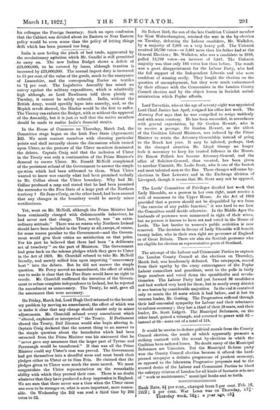The Lords' Committee of Privileges decided last week that Lady
Rhondda, as a peeress in her own right, must receive a writ of summons to the Upper House. As the Act of 1919 provided that a person should not be disqualified by sex from "the exercise of any public function," it was hard to see how the Committee could decide otherwise. In the Middle Ages tho husbands of peeresses were summoned in right of their wives, but no peeress is known to have eat and voted in the House of Lords. The last barrier to women's public activities is now removed. The decision in favour of Lady Rhondda will .benefit twenty ladies, who in their own right are peeresses of England or of Great Britain. There are also six Scottish peeresses who are eligible for election as representative peers of Scotland.


































 Previous page
Previous page